#more edit ideas please!
Text
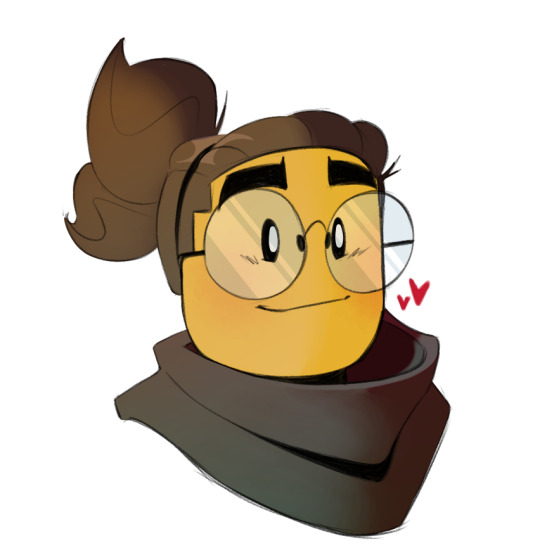
I'm a big believer that Tang had long hair when he was younger, It's true in my mind.
Also here's an artistic rendition of Mk's reaction when Tang finally decided to cut them (100% the scene from adventure time)
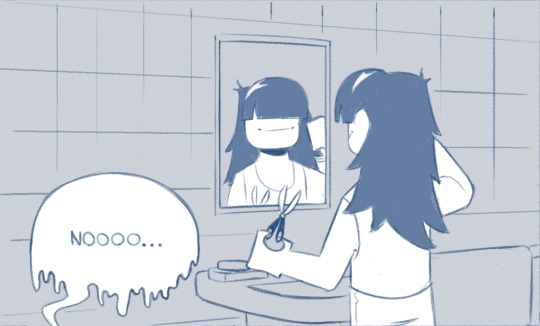



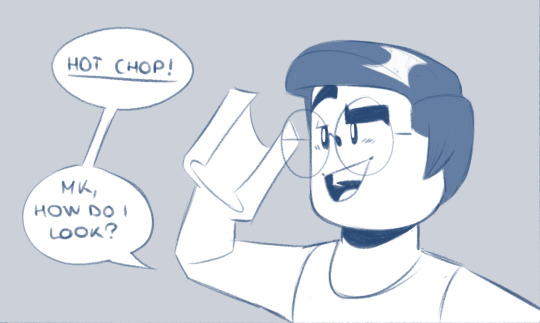

#lego monkie kid#lmk#lmk mk#lmk tang#mk monkie kid#tang monkie kid#my art#everytime I see an edit of Tang with long hair I get 2 more years in this world#he's just perfect with long hair#PLEASE GIVE THIS MAN LONG HAIR#I NEED IT#also sorry I have no idea if Finn actually says “hot chop” in that scene#but everyone just generally quotes that scene wrong so eh#it's okay if it's not 100% perfect
659 notes
·
View notes
Note
firm believer that yunho and or mingi get a kick out of seeing you stretched out — it plays with their size kink so much 🫠
my brain has short circuited everytime i rolled this ask around in my head, but heres what i got
cw: gn!reader, no pronouns, penetrative sex, unedited & mobile posted, tummy bulge, size kink, teasing, edging, fingering, implied poly!teez at the end for fun, double penetration, praise, maybe a hint of soft!dom,
edit 10/31/23: fixed like two mistakes, changed one word to make it gender neutral
fuck it so mingi is like fascinated when he first sees you stretched out on his cock, like he can’t believe that someone is capable of such. He’s both amazed and fucking proud when you take his cock, watching the bulge move with his hips. You have to snap him out of whatever trance he put himself in if you wanted any sort of progression
yunho on the other hand is more forward? Expressive? Very much the type to tease and edge as he tries to prepare you. I feel like his ego about it would come out a bit more during sex, sure he has to take longer to prep but this also means longer to scissor his fingers in you, longer to feel your ass, and longer to whisper things like “aw, is my dick really that big?” in effort to get you to admit that you needed help or wanted him to let you reach your peak. Seeing your skin flex and move even with his fingers has him rock hard, and he is so eager to see what you’re capable of.
As for them both, it’s a bit overwhelming being overstimulated on both cocks simultaneously. Yunho is slow, angling his hips to let his dick gently stroke your warm walls. Mingi is focused on the end, and Yunho is focused on the journey. Seeing both of them stretch you to the brim has Yunho’s knees turn to gelatin as he thinks “oh fuck thats hot”. And Mingi knows when he’s sheathed inside of you that he was never that tight for Yunho, and with the two of them buried inside of you as you moan for movement? Mingi’s brain becomes mush and he just wants to fuck the shit out of you. It’s Yunho that paces the situation, Mingi finishing all over his own stomach with a high pitched whine and you came all over Yunho’s cock.
#yunho smut#mingi smut#ateez smut#ateez thirsts#yunho x reader#mingi x reader#ateez hard hours#ateez hard thoughts#mingi hard hours#mingi hard thoughts#yunho hard hours#yunho hard thoughts#sorry my own insecurities made me rewrite this like eight times#and you sent this to me like a year ago im so sorry please forgive me 🫠#i loved this idea so much too sigh#edit tags:#something about this makes me want to write more for these two
557 notes
·
View notes
Text


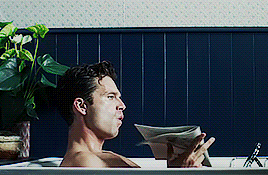



Sebastian Stan. in a bathtub, which is all I actually got out of this movie.
#mine#mine.#please don't add to gif hunts/claim as your own/edit without permission. thank you!#sebastian stan#sstanedit#sebstanedit#sebastianstanedit#we have always lived in this castle#whalitc#whalitcedit#if thats not the correct edit tag im not changing it#charles blackwood#charlesblackwoodedit#i skipped through this entire film on mute tbh i i have an idea of what the plot could be#but i really do not know anything i dont know if i want to know anything#as a 2010 aiw fan i got jumpscared by c/rispin g/lover#anyways#i do like c/rispins other roles dont get me wrong but when im not expecting him--#anyways.#more important#i think i have a few caps left for this film#i made these for c/rackship reasons but uhhhh#yknow#the fanfic girlies guys and nonbinary babes. here u go#blade cw#i didnt notice the frickan#i cant tell if its a flip razor or a regular razor#i went to beauty school i forgot the name#my thoughts are potentail stab and therefore n i c e
677 notes
·
View notes
Text
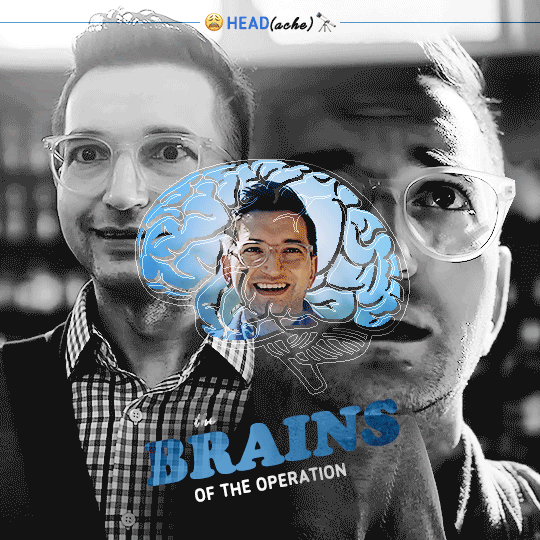
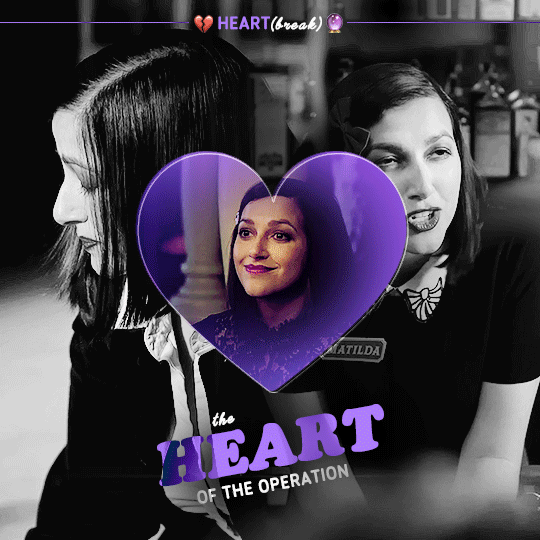

😩+💔+😎=✨
Headless: A Sleepy Hollow Story [x]
Bonus:
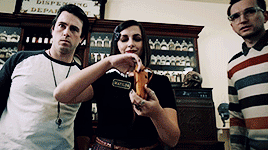
#headless: a sleepy hollow story#userthing#filmtvcentral#shipwrecked comedy#ichabod crane#sean persaud#matilda bishop#sinead persaud#brom bones#gabe greenspan#abraham van brunt#my edits#headlessedit#eeeee i actually did it!#i keep collecting ideas faster than i can make them#so pleased with this :D#have you seen a more perfect meme(s) for these three?#so i guess season 2 should be heartless...#...and does that make season 3 handless? lol
103 notes
·
View notes
Text

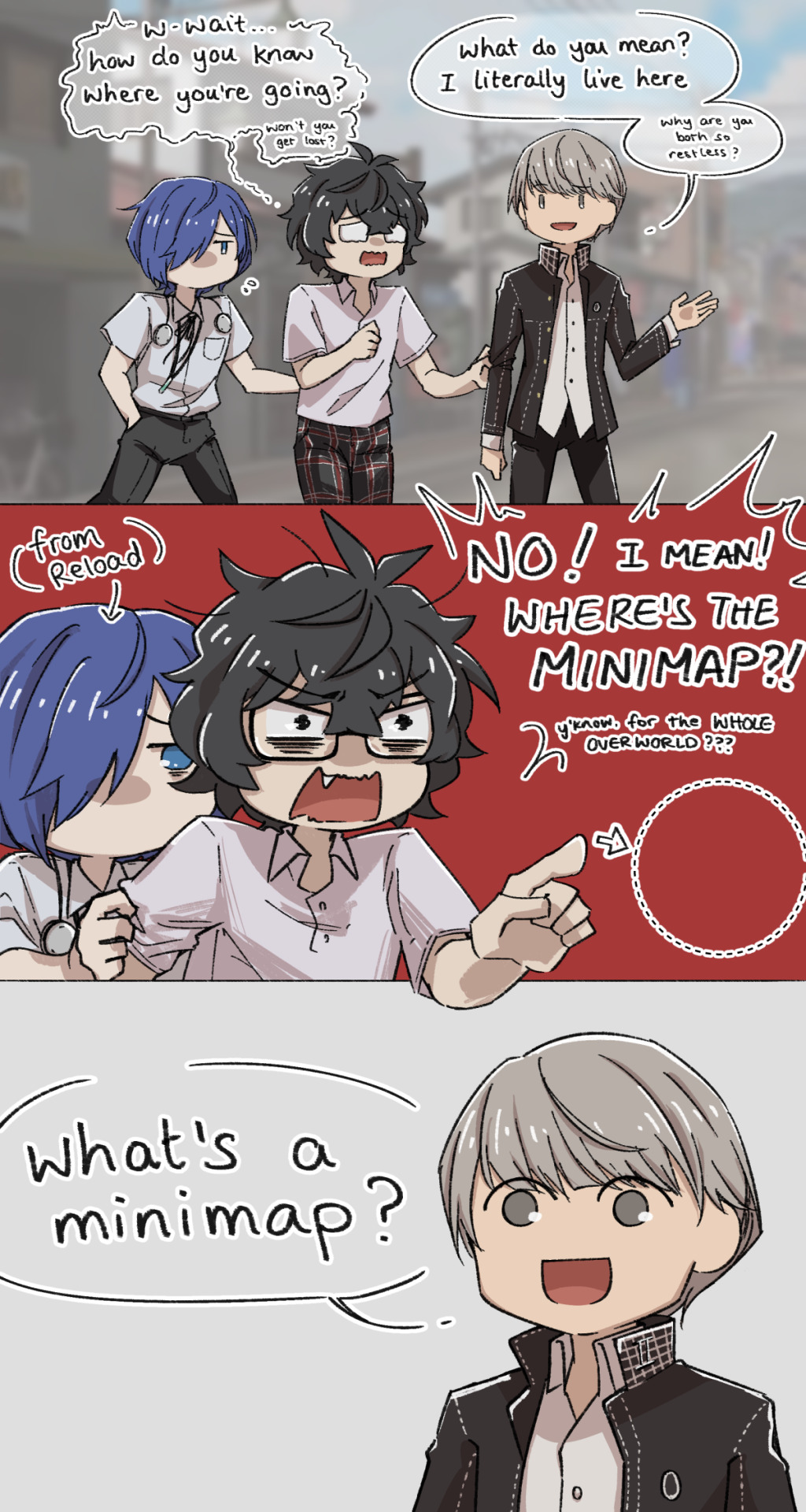
so i started playing persona 4
where are the QoL features
#persona series#art tag#ACK I FORGOR TO COLOUR THE BITS BEHIND HAIR nvm#i have no idea how to tag this!!#i fear what original p3 might have been like#i feel like a fake gamer man#like how did you guys do that#i feel like i would have given up if it was the first one i played#i am too stupid!!#im glad i have played through 5 and 3re#i am somewhat used to the flow of the game and the ability names#otherwise i would be STRUGGLING for my LIFE i tell you#like to be fair i dont think it's a huge world#BUT LIKE PLEASE IM LOST IN MY OWN HOUSE#also these protags are basically my OCs at this point#i borrow their canon personalities#and reshape them into something i like more hehehehe#edit: im crying im getting lowkey flamed on tweeter dot com#i just meant it as in joker spent a lot of time in tokyo!! one year changes a man!!#I KNOW inaba is small!! but QoL additions are always good!!#i get the appeal!! that you use your brain!!#you spend enough time to know the place!! but it's called QoL features not NECESSARY features!!#im cryin the boys ate just bantering#you can even read it as yu being like LOL you're a city boy now huh?? hahaha#now i really am fighting for my life and mental
124 notes
·
View notes
Note
MORE HAPRER PLEATHE HES SO FINE
youve asked this at such a good time because i had just had a harper design explanation idea and i wasnt sure if i should make it or not:
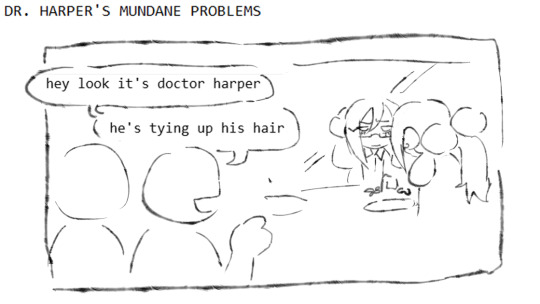


#im sorry i didnt do something more serious i tried to thats what ive been doing for the past since you sent this ask but. i couldnt#im sorry but feel free to send another ask and itll take me longer to get to it but ill draw something serious next time promise#my art#asks#harper the doctor#dol#anonymouse#sorry its not my usual style for this blog#just couldnt get it right with the other things#i also had to make like 4 new brushes because my old ones didnt feel right anymore#sigh. such is the life i lead#because i do think the side bun is cute but i do Not think harper would settle for that if there wasnt a good reason#my reasoning is that. harper cant tie their hair#please clap#im trying to find what this looks like though but i cant#but i swear one of these panels looks exactly like something ive drawn before#i just cant put my finger on it#maybe it was a sketch i deleted or something i have no idea#EDIT: found it it was a sketch on whiteboard my friend took a screenshot of#i dont feel right putting this in the dol tags because this is literally nothing. something that only applies to my design of harper#but i do want to keep my blog sorted :(
144 notes
·
View notes
Text

Naruhodo Legal Consultancy
(Wouldn’t it be fun if susato kept taking cases as naruhodo ryutaro post canon? As a defense lawyer employed by the naruhodo legal consultancy?)
#naruhodou ryuunosuke#naruhodou ryutaro#dai gyakuten saiban#dgs#the great ace attorney#tgaa#does this. count as tgaa spoilers. I mean it’s 2-1 so probably not right#anyways them????? they are the cousins of all time#god I love the ryuunosuke susato dynamic and how ryuu the weirdgirl empire susato being the assistant#together they just make a single weirdgirl assistant and I love that for them#susato as ryutaro gives me?? so much gender envy?? my god#a cap a cape and a gakuran that is like my Ideal Gender#anyways just post canon ideas hehe#I don’t see many people revisiting ryutaro in post canon fics and I think that is a Shame#because I personally would Love to see more of ryutaro#imagine ryuunosuke actually editing family records to include ryutaro so susato has more credibility in court#anyways please bear with me I’m still trying to figure out how to draw them lmao susato’s eyes don’t look quite right
379 notes
·
View notes
Text
Sometimes I think about how the dndads cast should be on tumblr, with them having a subreddit(you know how they can be) and dndadstwt being like 10 people, tumblr would be the perfect place for them to see more of the fandom, if they wish to that is. Since quite a lot of people on here are way less honed in on negativity than reddit and twitter.
My edit of this is getting long lol so I'm putting it under a cut
Especially reddit, the people on there honestly I think just get too attached to a specific format or way of doing things, its a common pattern in any long running show fandoms i've been in where its reddit that constantly complains about the "good ol' days" and hate any new changes made. I would sometimes drop in and just see a lot of Scary hate at times, or people getting very irritated with the rule breaking, or just complaining that they're "forcing" the humor. I saw a post like that when i just started s2 and that couldnt have been more incorrect (yeah the piss jokes got a bit much but every other part was golden!...pun not intended)
There were absolutely points where I felt my interest wanning, but I think people would get pretty vicious about it and make a lot of mean spirited accusations. Like if anything the things I really enjoyed about this season was how different it was to s1, the contrast was really nice and i liked a lot of the story choices made, i still think about the apollo four teens and the fucking goof realm episodes, they were amazing. Which is why I remember thinking it was odd that they suddenly started involving the dads from s1 more, but knowing now that Anthony was struggling with people not liking this season as much it makes perfect sense.
Idk if it were just me, but i liked the earlier parts of the season for how the teens were still kind of discovering more about themselves and through gathering each anchor, learning more that their parents are people too, with their own fuck ups revealed and the teens have to clean up after them, so having it shift to be about Willy again was a little odd if i'm being honest(I didnt hate it but a repeat villian is hard to do, and for what its worth i think Willy did get the end he deserved and i loved the finale).
Funnily, in its own way it fits the theme of being a teenager and having to live up to your parents expectations. In a meta sense this being the successor to the first season and it being awkward at points and having issues with its identity is very fitting and just like how teenhood actually is.
I've gotten off topic but my point is fandom is just fandom, and letting it influence the way creators can view their own work is an interesting side effect of the internet and the way we navigate with the media we enjoy or hate. And spaces like reddit are grown in a way to encourage more brutally critical ways of analysing media which has very little consideration for the creator. By no means am I saying that the creators of things should be coddled, heck I literally airing my own annoyances with the podcast in space where i'm uplifting the positivity of tumblr over those spaces lol. I just mean that seeing the more genuine side of the fanbase would be more of a better time for them.
EDIT: (I just phrased things better, fixed the spelling and grammer errors and added more thoughts) The more I ruminate on this the more I think that it would honestly be a good idea. Like I do get the base worry of being too close to the more intense side of the fandom, as people on here are unafraid to gush about the show in ways that can be a little much and theres parasociality and all that jazz.
But it would be really good at least to see some actual genuine positivity, so many people provide their thoughtful meta and theories that even if widely off base are just interesting to read through because of how various different people see themselves in the characters they play. And even the critiques people give are not unkind, they come from a place of wanting to understand the choices made better.
I mentioned this in the old version of this post but having a blacklisted tag that only the people who don't wish their post to be seen by the cast use, something along the lines like how the magnus archives fandom has "do not archive", would be a very useful tool to create a barrier in the fanbase. I know i'm someone who feels very nervous about creators seeing the posts I make. Something like "not safe for dads" could work well or any other joke or pun about it being hidden. I doubt it would be filled with discourse or whatever it would mainly be people hornyposting since i know fandom well enough lol.
#aster.txt#dndads#dungeons and daddies#i think people understandably may not want the creators of things here because it's very fandomy#and that sort of known idea that the creator could be seeing what you post can make people be less honest#at least i never feel comfortable with the creators seeing my posts about things i get shy over it#like idk it's embarrassing lol: they know now how much i enjoy the thing they make#I've edited the post!#Please reblog this version instead its more comphrehensive to my actual thoughts#that arent just a half assed post i put randomly in the main tag#dungeons and daddies podcast#fandom commentary
69 notes
·
View notes
Text


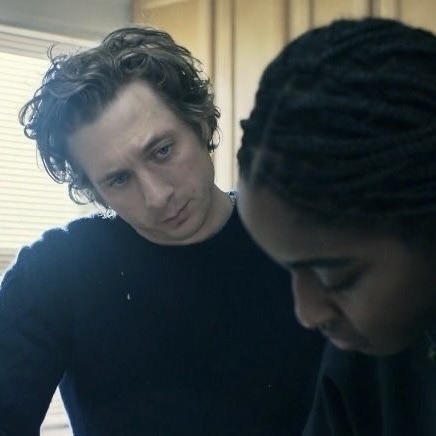
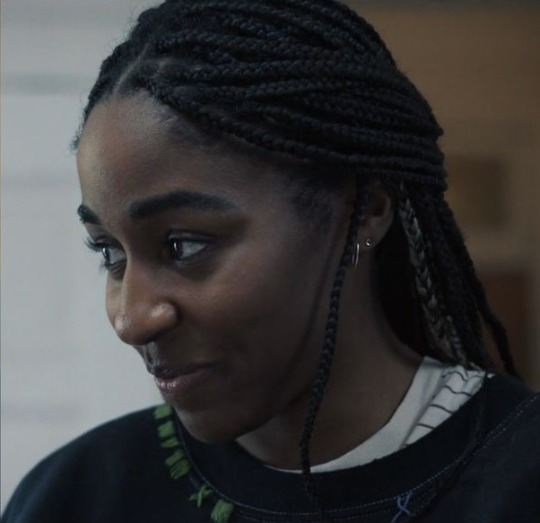
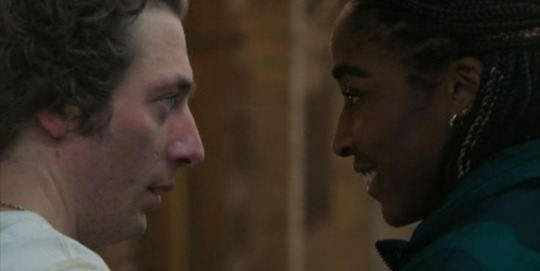

“but with everybody watching us, our every move, we do have reputations. we keep it secret. won’t let them have it”
#carmen berzatto#the bear#sydney adamu#sydcarmy#sydney x carmy#carmy berzatto#ayo edebiri#jeremy allen white#mitski#mitski x the bear#once more to see you#the brainrot is real#help me#the bear edit#the bear s3#making this into an edit#please no one steal the idea and make an incredible one i cannot beat
66 notes
·
View notes
Photo

edits practice turned joke comics cover with tom
#i could have gone on with more additional text on it but i run out of ideas and im not about to die on this hill#i was practicing this sort of edit time and just went lmao why not#im uploading the full size so you can zoom if you so desire#dream of the endless#TheSandmanEdit#sandmanedit#The Sandman#Morpheus#Lord Morpheus#dream#i suppose#jokes aside im rather pleased with how the helm looks like it ended up looking REALLY comics-like#hooray#buns.edits#buns.all
430 notes
·
View notes
Photo
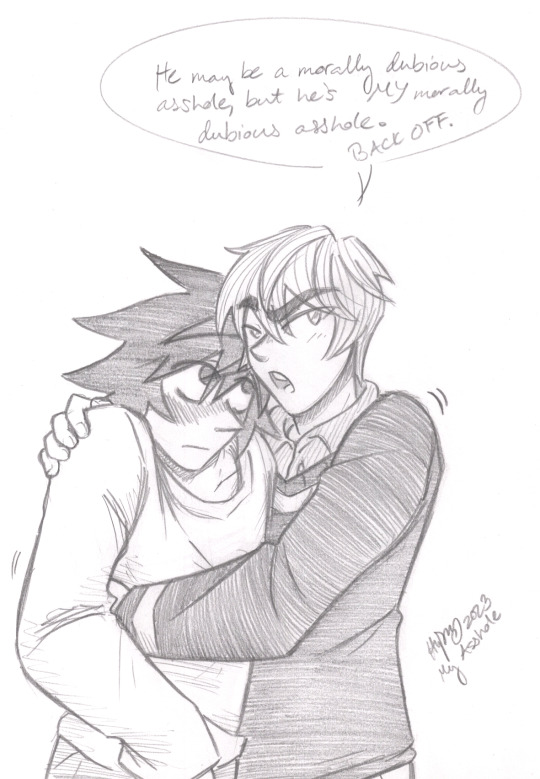

Light loves his asshole.
#drawn by me#my fanart#what can I say? he does#Death Note#L#Light Yagami#lawlight#please don't kill your asshole Light. it's not a good idea#the word of the day is: asshole#I'm immature lol#I actually edited more wholesome dialogue in these pics because I was feeling cowardly#but then I remembered I rated my blog 'mostly PG-13' so...#if anyone wants me to post the PG version of these just tell me so ehehe
293 notes
·
View notes
Text

blehhh
below the cut there is uhhhh video
what does this even mean
i love that video
i often forget that they can wear glasses i would pass by him and fog them just to annoy but i think he would love that
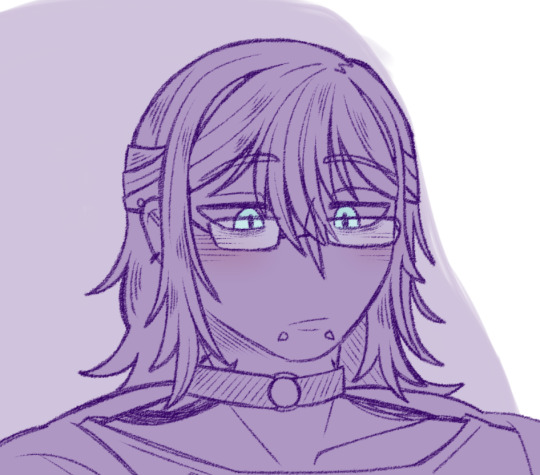

#14 days with you#14dwy#14dwy fanart#14dwy redacted#hey t don't lower the quality too mucb please thanks ilove u mua#now i know how to edit videos it's so over for you all......#i wanted to do something else with the first image but it was looking too messy#maybe i can try that idea another time when my brain isn't so bad i need 500 naps#i wanted to post after the queue finished but it's still going and i want to post before the month ends#and i don't want to post on my birthday my brain will be destroyed that day i have to take advantage that im still happy now#maybe if i draw them more i won't be so stressed he's like my stress toy#okback to my enclosure 🍖
147 notes
·
View notes
Photo
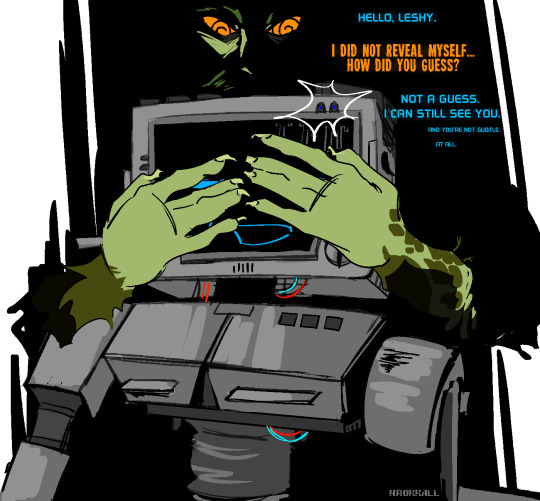
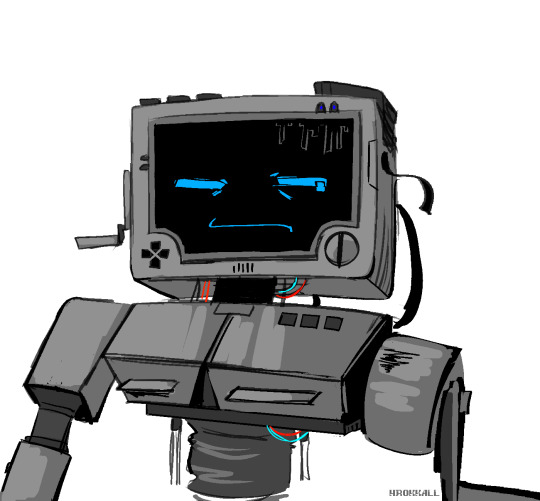

Saw a post the other day asking how P03 is able to see; my best guess is something like this.
I actually inspected P03′s 3D model for this which I don’t usually do (and then I proceeded to draw it off-model anyway. Whoops) but even outside of its hypothetical camera-vision, there’s a few other things of note:
P03 seems to have a lot of large vents (or at least things that look like some sort of ventilation/cooling). Two major ones on the chest, three on the top of the head (with potentially another on the side of its head), and one on the underside of its base (though that one might be for the hologram projection it uses to float). My best guess is that it’s because his factory is built right by the water where there would be a TON of moisture in the air. For that reason, some of them have got to be exhausts to make sure all of the air circulating in his torso is dry. That or he just overheats extremely easily I guess, but I’m leaning towards the humidity explanation (or it could be a combination of the two).
Its “eyes” are somewhere on the front of its face; whether it sees through a camera or just through the eyes on the screen via video game magic is up for debate, but it turns to face the player when they stand up so its vision probably isn’t on the sides of its head or something.
Similarly, P03 has some sort of sensitivity to touch (he reacts to Leshy’s hands gripping his monitor before Leshy says anything). I don’t think any “touch sensors” would be externally visible though.
Presumably (based on the ending to Act 3) P03′s head isn’t just a monitor, there’s vital systems in there as well (otherwise tearing its head off wouldn’t do anything to disrupt its upload/its ability to function). My best guess is that his power supply is in his chest so it would be the equivalent of just... unplugging your computer while it’s trying to preform updates.
The wire it uses to connect to the modules to update cards in Act 3 seems to come from either its neck or its torso, but in act 2 it’s very visibly on the side of the head. Granted the act 2 sprites are all pretty different from the Scrybes’ 3D models so that’s not an outlier.
The range of motion in P03′s arm seems pretty similar to a human arm; he has a ball-and-socket joint on the shoulder and a hinge joint on his elbow plus separate segments for the “wrist” and “hand”. The only thing it probably can’t do is twist its forearm.
I don’t have any idea what either of the cranks do. The head crank moves when it changes its expression so it might have something to do with its display, but the arm crank is only shown doing anything on the G0lly Uberbot hologram. My best guess is that P03 used to have a lot more built-in functions but ended up removing them in order to operate faster so a lot of the buttons and switches on it are just vestigial leftovers. (The idea of the arm crank being able to function as a hand-crank motor in a pinch is really funny though. Spin it a few times when P03 is out of power and you can generate just enough battery for it to tell you to fuck off then go back into sleep mode again).
I have no idea how the levitation works either. It’s cool and that’s why it works. No need to get more complicated than that.
#P03#Hrokkall Sketch#Leshy is there too I guess but I'm not tagging him#I will talk about him for a second though#Unrelated to P03 but I headcanon Leshy had claws at one point (and still could grow them back)#He just chewed them off out of stress at some point between KMod and the main game#I have no idea who OP of the other post was that one's on me (and tumblr's search function is kind of shit so I can't find it </3)#Also I'll be honest I know nothing I'm saying is new: this is moreso reference for me#Sorry to anyone looking in the P03 maintag; this is just tagged with it for blog organization </3#I might elaborate on some of this tomorrow (and make a more on-model drawing) I just wanted to get my thoughts down#EDIT: Feel free to add on! Please share your thoughts in my inbox if you have them I love reading them#EDIT 2: Added alt text + fixed some confusing wording#EDIT 3: Original post was by exlann
428 notes
·
View notes
Text
pairing ten's "will just kind of let himself be used as a vessel for romance if someone makes the first move" trait with his "spent a whole season not catching that his codependence insanity bestie was in love with him" trait means that if martha had made like astrid or christina and confessed/kissed him outright i think they would have entered a 10x more nightmarish toxic relationship where ten would attempt to get on the comphet grind to ignore his ptsd and depression harder and martha would have to speedrun all the highlights of a loveless marriage with a 20th century war veteran that never learned what being aroace is. i think she would have to leave and never talk to him again
#sorry i think this is a bad post i peaked with the ten is a bus driver one and it's downhill from here#dr who#ten and martha#aspec doc tag#edit; please note i am picturing this post lazarus experiment where ten is back to being insane enough#to offer joan of all people to be his companion. off the self isolation grind still on the s3 insanity#edit 2. thinking about this more. this post is still bad but it has ideas in it.#like i don't think early s3 ten had it in him to lead martha on so she'd stay w him obv. hes too autistic aroace for that.#but i DO think he has a 50% chance in him mid s3 to react to an undeniable confession/display of love this way#and martha would like catch onto him a month in and would have to leave. for his own good if not hers#ten could jotaro pacificism fic his way to hell and back but only during this specific time and only with her. gbles#10 era
109 notes
·
View notes
Text
Twelve, Thirteen, and One
Words: 6k
Rating: G
Themes: Friendship, Self-Giving Love
(Written for the Four Loves Fairytale Retelling Challenge over at the @inklings-challenge! A Cinderella retelling feat. curious critters and a lot of friendship.)
When the clock chimes midnight on that third evening, thirteen creatures look to the girl who showed them all kindness.
—
It’s hours after dark, again, and the human girl still sleeps in the ashes.
The mice notice this—though it happens so often that they’ve ceased to pay attention to her. She smells like everything else in the hearth: ashy and overworked, tinged with the faint smell of herbs from the kitchen.
When she moves or shifts in her sleep (uncomfortable sleep—even they can sense the exhaustion in her posture as she sits slumped against the wall, more willing to seep up warmth from the stone than lie cold elsewhere this time of year), they simply scurry around her and continue combing for crumbs and seeds. They’d found a feast of lentils scattered about once, and many other times, the girl had beckoned them softly to her hand, where she’d held a little chunk of brown bread.
Tonight, she has nothing. They don’t mind—though three of them still come to sniff her limp hand where it lies drooped against the side of her tattered dress.
A fourth one places a little clawed hand on the side of her finger, leaning over it to investigate her palm for any sign of food.
When she stirs, it’s to the sensation of a furry brown mouse sitting in her palm.
It can feel the flickering of her muscles as she wakes—feeling slowly returning to her body. To her credit, she cracks her eyes open and merely observes it.
They’re all but tame by now. The Harsh-Mistress and the Shrieking-Girl and the Angry-Girl are to be avoided like the plague never was, but this girl—the Cinder-Girl, they think of her—is gentle and kind.
Even as she shifts a bit and they hear the dull crack of her joints, they’re too busy to mind. Some finding a few buried peas (there were always some peas or lentils still hidden here, if they looked carefully), some giving themselves an impromptu bath to wash off the dust. The one sitting on her hand is doing the latter, fur fluffed up as it scratches one ear and then scrubs tirelessly over its face with both paws.
One looks up from where it’s discovered a stray pea to check her expression.
A warm little smile has crept up her face, weary and dirty and sore as she seems to be. She stays very still in her awkward half-curl against stone, watching the mouse in her hand groom itself. The tender look about her far overwhelms—melts, even—the traces of tension in her tired limbs.
Very slowly, so much so that they really aren’t bothered by it, she raises her spare hand and begins lightly smearing the soot away from her eyes with the back of her wrist.
The mouse in her palm gives her an odd look for the movement, but has discovered her skin is warmer than the cold stone floor or the ash around the dying fire. It pads around in a circle once, then nudges its nose against her calloused skin, settling down for a moment.
The Cinder-Girl has closed her eyes again, and drops her other hand into her lap, slumping further against the wall. Her smile has grown even warmer, if sadder.
They decide she’s quite safe. Very friendly.
—
The old rat makes his rounds at the usual times of night, shuffling through a passage that leads from the ground all the way up to the attic.
When both gold sticks on the clocks’ moonlike faces point upward, there’s a faint chime from the tower-clock downstairs. He used to worry that the sound would rouse the humans. Now, he ignores it and goes about his business.
There’s a great treasury of old straw in the attic. It’s inside a large sack—and while this one doesn’t have corn or wheat like the ones near the kitchen sometimes do, he knows how to chew it open all the same.
The girl sleeps on this sack of straw, though she doesn’t seem to mind what he takes from it. There’s enough more of it to fill a hundred rat’s nests, so he supposes she doesn’t feel the difference.
Tonight, though—perhaps he’s a bit too loud in his chewing and tearing. The girl sits up slowly in bed, and he stiffens, teeth still sunk into a bit of the fabric.
“Oh.” says the girl. She smiles—and though the expression should seem threatening, all pulled mouth-corners and teeth, he feels the gentleness in her posture and wonders at novel thoughts of differing body languages. “Hello again. Do you need more straw?”
He isn’t sure what the sounds mean, but they remind him of the soft whuffles and squeaks of his siblings when they were small. Inquisitive, unafraid. Not direct or confrontational.
She’s seemed safe enough so far—almost like the woman in white and silver-gold he’s seen here sometimes, marveling at his own confidence in her safeness—so he does what signals not-afraid the best to his kind. He glances her over, twitches his whiskers briefly, and goes back to what he was doing.
Some of the straw is too big and rough, some too small and fine. He scratches a bundle out into a pile so he can shuffle through it. It’s true he doesn’t need much, but the chill of winter hasn’t left the world yet.
The girl laughs. The sound is soft and small. It reminds him again of young, friendly, peaceable.
“Take as much as you need,” she whispers. Her movements are unassuming when she reaches for something on the old wooden crate she uses as a bedside table. With something in hand, she leans against the wall her bed is a tunnel’s-width from, and offers him what she holds. “Would you like this?”
He peers at it in the dark, whiskers twitching. His eyesight isn’t the best, so he finds himself drawing closer to sniff at what she has.
It’s a feather. White and curled a bit, like the goose-down he’d once pulled out the corner of a spare pillow long ago. Soft and long, fluffy and warm.
He touches his nose to it—then, with a glance upward at her softly-smiling face, takes it in his teeth.
It makes him look like he has a mustache, and is a bit too big to fit through his hole easily. The girl giggles behind him as he leaves.
—
There’s a human out in the gardens again. Which is strange—this is a place for lizards, maybe birds and certainly bugs. Not for people, in his opinion. She’s not dressed in venomous bright colors like the other humans often are, but neither does she stay to the manicured garden path the way they do.
She doesn’t smell like unnatural rotten roses, either. A welcome change from having to dart for cover at not just the motions, but the stenches that accompany the others that appear from time to time.
This human is behind the border-shubs, beating an ornate rug that hangs over the fence with a home-tied broom. Huge clouds of dust shake from it with each hit, settling in a thin film on the leaves and grass around her.
She stops for a moment to press her palm to her forehead, then turns over her shoulder and coughs into her arm.
When she begins again, it’s with a sharp WHOP.
He jumps a bit, but only on instinct. However—
A few feet from where he settles back atop the sunning-rock, there’s a scuffle and a sharp splash. Then thrashing—waster swashing about with little churns and splishes.
It’s not the way of lizards to think of doing anything when one falls into the water. There were several basins for fish and to catch water off the roof for the garden—they simply had to not fall into them, not drown. There was little recourse for if they did. What could another lizard do, really? Fall in after them? Best to let them try to climb out if they could.
The girl hears the splashing. She stares at the water pot for a moment.
Then, she places her broom carefully on the ground and comes closer.
Closer. His heart speeds up. He skitters to the safety of a plant with low-hanging leaves—
—and then watches as she walks past his hiding place, peers into the basin, and reaches in.
Her hand comes up dripping wet, a very startled lizard still as a statue clinging to her fingers.
“Are you the same one I always find here?” she asks with a chiding little smile. “Or do all of you enjoy swimming?”
When she places her hand on the soft spring grass, the lizard darts off of it and into the underbrush. It doesn’t go as far as it could, though—something about this girl makes both of them want to stand still and wait for what she’ll do next.
The girl just watches it go. She lets out a strange sound—a weary laugh, perhaps—and turns back to her peculiar chore.
—
A song trails through the old house—under the floorboards—through the walls—into the garden, beneath the undergrowth—and lures them out of hiding.
It isn’t an audible song, not like that of the birds in the summer trees or the ashen-girl murmuring beautiful sounds to herself in the lonely hours. This one was silent. Yet, it reached deep down into their souls and said come out, please—the one who helped you needs your help.
It didn’t require any thought, no more than eat or sleep or run did.
In chains of silver and grey, all the mice who hear it converge, twenty-four tiny feet pattering along the wood in the walls. The rat joins them, but they are not afraid.
When they emerge from a hole out into the open air, the soft slip-slap of more feet surround them. Six lizards scurry from the bushes, some gleaming wet as if they’d just escaped the water trough or run through the birdbath themselves.
As a strange little hoard, they approach the kind girl. Beside her is a tall woman wearing white and silver and gold.
The girl—holding a large, round pumpkin—looks surprised to see them here. The woman is smiling.
“Set the pumpkin on the drive,” the woman says, a soft gleam in her eye. “The rest of you, line up, please.”
Bemused, but with a heartbeat fast enough for them to notice, the girl gingerly places the pumpkin on the stone of the drive. It’s natural for them, somehow, to follow—the mice line in pairs in front of it, the rat hops on top of it, and the lizards all stand beside.
“What are they doing?” asks the girl—and there’s curiosity and gingerness in her tone, like she doesn’t believe such a sight is wrong, but is worried it might be.
The older woman laughs kindly, and a feeling like blinking hard comes over the world.
It’s then—then, in that flash of darkness that turns to dazzling light, that something about them changes.
“Oh!” exclaims the girl, and they open their eyes. “Oh! They’re—“
They’re different.
The mice aren’t mice at all—and suddenly they wonder if they ever were, or if it was an odd dream.
They’re horses, steel grey and sleek-haired with with silky brown manes and tails. Their harnesses are ornate and stylish, their hooves polished and dark.
Instead of a rat, there’s a stout man in fine livery, with whiskers dark and smart as ever. He wears a fine cap with a familiar white feather, and the gleam in his eye is surprised.
“Well,” he says, examining his hands and the cuffs of his sleeves, “I suppose I won’t be wanting for adventure now.”
Instead of six lizards, six footmen stand at attention, their ivory jackets shining in the late afternoon sun.
The girl herself is different, though she’s still human—her hair is done up beautifully in the latest fashion, and instead of tattered grey she wears a shimmering dress of lovely pale green, inlaid with a design that only on close inspection is flowers.
“They are under your charge, now,” says the woman in white, stepping back and folding her hands together. “It is your responsibility to return before the clock strikes midnight—when that happens, the magic will be undone. Understood?”
“Yes,” says the girl breathlessly. She stares at them as if she’s been given the most priceless gift in all the world. “Oh, thank you.”
—
The castle is decorated brilliantly. Flowery garlands hang from every parapet, beautiful vines sprawling against walls and over archways as they climb. Dozens of picturesque lanterns hang from the walls, ready to be lit once the sky grows dark.
“It’s been so long since I’ve seen the castle,” the girl says, standing one step out of the carriage and looking so awed she seems happy not to go any further. “Father and I used to drive by it sometimes. But it never looked so lovely as this.”
“Shall we accompany you in, milady?” asks one of the footmen. They’re all nearly identical, though this one has freckles where he once had dark flecks in his scales.
She hesitates for only a moment, looking up at the pinnacles of the castle towers. Then, she shakes her head, and turns to look at them all with a smile like the sun.
“I think I’ll go in myself,” she says. “I’m not sure what is custom. But thank you—thank you so very much.”
And so they watch her go—stepping carefully in her radiant dress that looked lovelier than any queen’s.
Though she was not royal, it seemed there was no doubt in anyone’s minds that she was. The guards posted at the door opened it for her without question.
With a last smile over her shoulder, she stepped inside.
—
He's straightening the horses' trappings for the fifth time when the doors to the castle open, and out hurries a figure. It takes him a moment to recognize her, garbed in rich fabrics and cloaked in shadows, but it's the girl, rushing out to the gilded carriage. A footman steps forward and offers her a hand, which she accepts gratefully as she steps up into the seat.
“Enjoyable evening, milady?” asks the coachman. His whiskers are raised above the corners of his mouth, and his twinkling eyes crinkle at the edges.
“Yes, quite, thank you!” she breathes in a single huff. She smooths her dress the best she can before looking at him with some urgency. “The clock just struck quarter till—will you be able to get us home?”
The gentle woman in white had said they only would remain in such states until midnight. How long was it until the middle of night? What was a quarter? Surely darkness would last for far more hours than it had already—it couldn’t be close. Yet it seemed as though it must be; the princesslike girl in the carriage sounded worried it would catch them at any moment.
“I will do all I can,” he promises, and with a sharp rap of the reins, they’re off at a swift pace.
They arrive with minutes to spare. He knows this because after she helps him down from the carriage (...wait. That should have been the other way around! He makes mental note for next time: it should be him helping her down. If he can manage it. She’s fast), she takes one of those minutes to show him how his new pocketwatch works.
He’s fascinated already. There’s a part of him that wonders if he’ll remember how to tell time when he’s a rat again—or will this, all of this, be forgotten?
The woman in white is there beside the drive, and she’s already smiling. A knowing gleam lights her eye.
“Well, how was the ball?” she asks, as Cinder-Girl turns to face her with the most elated expression. “I hear the prince is looking for fair maidens. Did he speak with you?”
The girl rushes to grasp the woman’s hands in hers, clasping them gratefully and beaming up at her.
“It was lovely! I’ve never seen anything so lovely,” she all but gushes, her smile brighter and broader than they’d ever seen it. “The castle is beautiful; it feels so alive and warm. And yes, I met the Prince—although hush, he certainly isn’t looking for me—he’s so kind. I very much enjoyed speaking with him. He asked me to dance, too; I had as wonderful a time as he seemed to. Thank you! Thank you dearly.”
The woman laughs gently. It isn’t a laugh one would describe as warm, but neither is it cold in the sense some laughs can be—it's soft and beautiful, almost crystalline.
“That’s wonderful. Now, up to bed! You’ve made it before midnight, but your sisters will be returning soon.”
“Yes! Of course,” she replies eagerly—turning to smile gratefully at coachman and stroke the nearest horses on their noses and shoulders, then curtsy to the footmen. “Thank you all, very much. I could not ask for a more lovely company.”
It’s a strange moment when all of their new hearts swell with warmth and affection for this girl—and then the world darkens and lightens so quickly they feel as though they’ve fallen asleep and woken up.
They’re them again—six mice, six lizards, a rat, and a pumpkin. And a tattered gray dress.
“Please, would you let me go again tomorrow? The ball will last three days. I had such a wonderful time.”
“Come,” the woman said simply, “and place the pumpkin beneath the bushes.”
The woman in white led the way back to the house, followed by an air-footed girl and a train of tiny critters. There was another silent song in the air, and they thought perhaps the girl could hear it too: one that said yes—but get to bed!
—
The second evening, when the door of the house thuds shut and the hoofsteps of the family’s carriage fade out of hearing, the rat peeks out of a hole in the kitchen corner to see the Cinder-Girl leap to her feet.
She leans close to the window and watched for more minutes than he quite understands—or maybe he does; it was good to be sure all cats had left before coming out into the open—and then runs with a spring in her step to the back door near the kitchen.
Ever so faintly, like music, the woman’s laughter echoes faintly from outside. Drawn to it like he had been drawn to the silent song, the rat scurries back through the labyrinth of the walls.
When he hurries out onto the lawn, the mice and lizards are already there, looking up at the two humans expectantly. This time, the Cinder-Girl looks at them and smiles broadly.
“Hello, all. So—how do you do it?” she asks the woman. Her eyes shine with eager curiosity. “I had no idea you could do such a thing. How does it work?”
The woman fixes her with a look of fond mock-sternness. “If I were to explain to you the details of how, I’d have to tell you why and whom, and you’d be here long enough to miss the royal ball.” She waves her hands she speaks. “And then you’d be very much in trouble for knowing far more than you ought.”
The rat misses the girl’s response, because the world blinks again—and now all of them once again are different. Limbs are long and slender, paws are hooves with silver shoes or feet in polished boots.
The mouse-horses mouth at their bits as they glance back at the carriage and the assortment of humans now standing by it. The footmen are dressed in deep navy this time, and the girl wears a dress as blue as the summer sky, adorned with brilliant silver stars.
“Remember—“ says the woman, watching fondly as the Cinder-Girl steps into the carriage in a whorl of beautiful silk. “Return before midnight, before the magic disappears.”
“Yes, Godmother,” she calls, voice even more joyful than the previous night. “Thank you!”
—
The castle is just as glorious as before—and the crowd within it has grown. Noblemen and women, royals and servants, and the prince himself all mill about in the grand ballroom.
He’s unsure of the etiquette, but it seems best for her not to enter alone. Once he escorts her in, the coachman bows and watches for a moment—the crowd is hushed again, taken by her beauty and how important they think her to be—and then returns to the carriage outside.
He isn’t required in the ballroom for much of the night—but he tends to the horses and checks his pocketwatch studiously, everything in him wishing to be the best coachman that ever once was a rat.
Perhaps that wouldn’t be hard. He’d raise the bar, then. The best coachman that ever drove for a princess.
Because that was what she was—or, that was what he heard dozens of hushed whispers about once she’d entered the ball. Every noble and royal and servant saw her and deemed her a grand princess nobody knew from a land far away. The prince himself stared at her in a marveling way that indicated he thought no differently.
It was a thing more wondrous than he had practice thinking. If a mouse could become a horse or a rat could become a coachman, couldn’t a kitchen-girl become a princess?
The answer was yes, it seemed—perhaps in more ways than one.
She had rushed out with surprising grace just before midnight. They took off quickly, and she kept looking back toward the castle door, as if worried—but she was smiling.
“Did you know the Prince is very nice?” she asks once they’re safely home, and she’s stepped down (drat) without help again. The woman in white stands on her same place beside the drive, and when Cinder-Girl sees her, she waves with dainty grace that clearly holds a vibrant energy and sheer thankfulness behind it. “I’ve never known what it felt like to be understood. He thinks like I do.”
“How is that?” asks the woman, quirking an amused brow. “And if I might ask, how do you know?”
“Because he mentions things first.” The girl tries to smother some of the wideness of her smile, but can’t quite do so. “And I've shared his thoughts for a long time. That he loves his father, and thinks oranges and citrons are nice for festivities especially, and that he’s always wanted to go out someday and do something new.”
—
The third evening, the clouds were dense and a few droplets of rain splattered the carriage as they arrived.
“Looks like rain, milady,” said the coachman as she disembarked to stand on water-spotted stone. “If it doesn’t blow by, we’ll come for ye at the steps, if it pleases you.”
“Certainly—thank you,” she replies, all gleaming eyes and barely-smothered smiles. How her excitement to come can increase is beyond them—but she seems more so with each night that passes.
She has hardly turned to head for the door when a smattering of rain drizzles heavily on them all. She flinches slightly, already running her palms over the skirt of her dress to rub out the spots of water.
Her golden dress glisters even in the cloudy light, and doesn’t seem to show the spots much. Still, it’s hardy an ideal thing.
“One of you hold the parasol—quick about it, now—and escort her inside,” the coachman says quickly. The nearest footman jumps into action, hop-reaching into the carriage and falling back down with the umbrella in hand, unfolding it as he lands. “Wait about in case she needs anything.”
The parasol is small and not meant for this sort of weather, but it's enough for the moment. The pair of them dash for the door, the horses chomping and stamping behind them until they’re driven beneath the bows of a huge tree.
The footman knows his duty the way a lizard knows to run from danger. He achieves it the same way—by slipping off to become invisible, melting into the many people who stood against the golden walls.
From there, he watches.
It’s so strange to see the way the prince and their princess gravitate to each other. The prince’s attention seems impossible to drag away from her, though not for many’s lack of trying.
Likewise—more so than he would have thought, though perhaps he’s a bit slow in noticing—her focus is wholly on the prince for long minutes at a time.
Her attention is always divided a bit whenever she admires the interior of the castle, the many people and glamorous dresses in the crowd, the vibrant tables of food. It’s all very new to her, and he’s not certain it doesn’t show. But the Prince seems enamored by her delight in everything—if he thinks it odd, he certainly doesn’t let on.
They talk and laugh and sample fine foods and talk to other guests together, then they turn their heads toward where the musicians are starting up and smile softly when they meet each other’s eyes. The Prince offers a hand, which is accepted and clasped gleefully.
Then, they dance.
Their motions are so smooth and light-footed that many of the crowd forgo dancing, because admiring them is more enjoyable. They’re in-sync, back and forth like slow ripples on a pond. They sometimes look around them—but not often, especially compared to how long they gaze at each other with poorly-veiled, elated smiles.
The night whirls on in flares of gold tulle and maroon velvet, ivory, carnelian, and emerald silks, the crowd a nonstop blur of color.
(Color. New to him, that. Improved vision was wonderful.)
The clock strikes eleven, but there’s still time, and he’s fairly certain he won’t be able to convince the girl to leave anytime before midnight draws near.
He was a lizard until very recently. He’s not the best at judging time, yet. Midnight does draw near, but he’s not sure he understands how near.
The clock doesn’t quite say up-up. So he still has time. When the rain drums ceaselessly outside, he darts out and runs in a well-practiced way to find their carriage.
—
Another of the footmen comes in quickly, having been sent in a rush by the coachman, who had tried to keep his pocketwatch dry just a bit too long. He’s soaking wet from the downpour when he steps close enough to get her attention.
She sees him, notices this, and—with a glimmer of recognition and amusement in her eyes—laughs softly into her hand.
ONE—TWO— the clock starts. His heart speeds up terribly, and his skin feels cold. He suddenly craves a sunny rock.
“Um,” he begins awkwardly. Lizards didn’t have much in the way of a vocal language. He bows quickly, and water drips off his face and hat and onto the floor. “The chimes, milady.”
THREE—FOUR—
Perhaps she thought it was only eleven. Her face pales. “Oh.”
FIVE—SIX—
Like a deer, she leaps from the prince’s side and only manages a stumbling, backward stride as she curtsies in an attempt at a polite goodbye.
“Thank you, I must go—“ she says, and then she’s racing alongside the footman as fast as they both can go. The crowd parts for them just enough, amidst loud murmurs of surprise.
SEVEN—EIGHT—
“Wait!” calls the prince, but they don’t. Which hopefully isn’t grounds for arrest, the footman idly thinks.
They burst through the door and out into the open air.
NINE—TEN—
It has been storming. The rain is crashing down in torrents—the walkways and steps are flooded with a firm rush of water.
She steps in a crevice she couldn’t see, the water washes over her feet, and she stumbles, slipping right out of one shoe. There’s noise at the door behind them, so she doesn’t stop or even hesitate. She runs at a hobble and all but dives through the open carriage door. The awaiting footman quickly closes it, and they’re all grasping quickly to their riding-places at the corners of the vehicle.
ELEVEN—
A flash of lightning coats the horses in white, despite the dark water that’s soaked into their coats, and with a crack of the rains and thunder they take off at a swift run.
There’s shouting behind them—the prince—as people run out and call to the departing princess.
TWELVE.
Mist swallows them up, so thick they can’t hear or see the castle, but the horses know the way.
The castle’s clock tower must have been ever-so-slightly fast. (Does magic tell truer time?) Their escape works for a few thundering strides down the invisible, cloud-drenched road—until true midnight strikes a few moments later.
—
She walks home in the rain and fog, following a white pinprick of light she can guess the source of—all the while carrying a hollow pumpkin full of lizards, with an apron pocket full of mice and a rat perched on her shoulder.
It’s quite the walk.
—
The prince makes a declaration so grand that the mice do not understand it. The rat—a bit different now—tells them most things are that way to mice, but he’s glad to explain.
The prince wants to find the girl who wore the golden slipper left on the steps, he relates. He doesn’t want to ask any other to marry him, he loved her company so.
The mice think that’s a bit silly. Concerning, even. What if he does find her? There won’t be anyone to secretly leave seeds in the ashes or sneak them bread crusts when no humans are looking.
The rat thinks they’re being silly and that they’ve become too dependent on handouts. Back in his day, rodents worked for their food. Chewing open a bag of seed was an honest day’s work for its wages.
Besides, he confides, as he looks again out the peep-hole they’ve discovered in the floor trim of the parlor. You’re being self-interested, if you ask me. Don’t you want our princess to find a good mate, and live somewhere spacious and comfortable, free of human-cats, where she’d finally have plenty to eat?
It’s hard to make a mouse look appropriately chastised, but that question comes close. They shuffle back a bit to let him look out at the strange proceedings in the parlor again.
There are many humans there. The Harsh-Mistress stands tall and rigid at the back of one of the parlor chairs, exchanging curt words with a strange man in fine clothes with a funny hat. Shrieking-Girl and Angry-Girl stand close, scoffing and laughing, looking appalled.
Cinder-Girl sits on the chair that’s been pulled to the middle of the room. She extends her foot toward a strange golden object on a large cushion.
The shoe, the rat notes so the mice can follow. They can’t quite see it from here—poor eyesight and all.
Of course, the girl’s foot fits perfectly well into her own shoe. They all saw that coming.
Evidently, the humans did not. There’s absolute uproar.
“There is no possible way she’s the princess you’re looking for!” declares Harsh-Mistress, her voice full of rage. “She’s a kitchen maid. Nothing royal about her.”
“How dare you!” Angry-Girl rages. “Why does it fit you? Why not us?”
“You sneak!” shrieks none other than Shrieking-Girl. “Mother, she snuck to the ball! She must have used magic, somehow! Princes won’t marry sneaks, will they?”
“I think they might,” says a calm voice from the doorway, and the uproar stops immediately.
The Prince steps in. He stares at Cinder-Girl.
She stares back. Her face is still smudged with soot, and her dress is her old one, gray and tattered. The golden slipper gleams on her foot, having fit as only something molded or magic could.
A blush colors her face beneath the ash and she leaps up to do courtesy. “Your Highness.”
The Prince glances at the messenger-man with the slipper-pillow and the funny hat. The man nods seriously.
The Prince blinks at this, as if he wasn’t really asking anything with his look—it’s already clear he recognizes her—and meets Cinder-Girl’s gaze with a smile. It’s the same half-nervous, half-attemptingly-charming smile as he kept giving her at the ball.
He bows to her and offers a hand. (The rat has to push three mice out of the way to maintain his view.)
“It’s my honor,” he assures her. “Would you do me the great honor of accompanying me to the castle? I’d had a question in mind, but it seems there are—“ he glances at Harsh-Mistress, who looks like a very upset rat in a mousetrap. “—situations we might discuss remedying. You’d be a most welcome guest in my father’s house, if you’d be amenable to it?”
It’s all so much more strange and unusual than anything the creatures of the house are used to seeing. They almost don’t hear it, at first—that silent song.
It grows stronger, though, and they turn their heads toward it with an odd hope in their hearts.
—
The ride to the castle is almost as strange as that prior walk back. The reasons for this are such:
One—their princess is riding in their golden carriage alongside the prince, and their chatter and awkward laughter fills the surrounding spring air. They have a good feeling about the prince, now, if they didn’t already. He can certainly take things in stride, and he is no respecter of persons. He seems just as elated to be by her side as he was at the ball, even with the added surprise of where she'd come from.
Two—they have been transformed again, and the woman in white has asked them a single question: Would you choose to stay this way?
The coachman said yes without a second thought. He’d always wanted life to be more fulfilling, he confided—and this seemed a certain path to achieving that.
The footmen might not have said yes, but there was something to be said for recently-acquired cognition. It seemed—strange, to be human, but the thought of turning back into lizards had the odd feeling of being a poor choice. Baffled by this new instinct, they said yes.
The horses, of course, said things like whuff and nyiiiehuhum, grumph. The woman seemed to understand, though. She touched one horse on the nose and told it it would be the castle’s happiest mouse once the carriage reached its destination. The others, it seemed, enjoyed their new stature.
And three—they are heading toward a castle, where they have all been offered a fine place to live. The Prince explains that he doesn’t wish for such a kind girl to live in such conditions anymore. There’s no talk of anyone marrying—just discussions of rooms and favorite foods and of course, you’ll have the finest chicken pie anytime you’d like and I can’t have others make it for me! Lend me the kitchens and I’ll make some for you; I have a very dear recipe. Perhaps you can help. (Followed in short order by a ...Certainly, but I’d—um, I’d embarrass myself trying to cook. You would teach me? and a gentle laugh that brightened the souls of all who could hear it.)
“If you’d be amenable to it,” she replies—and in clear, if surprised, agreement, the Prince truly, warmly laughs.
“Milady,” the coachman calls down to them. “Your Highness. We’re here.”
The castle stands shining amber-gold in the light of the setting sun. It will be the fourth night they’ve come here—the thirteen of them and the one of her—but midnight, they realize, will not break the spell ever again.
One by one, they disembark from the carriage. If it will stay as it is or turn back into a pumpkin, they hadn't thought to ask. There’s so much warmth swelling in their hearts that they don’t think it matters.
The girl, their princess, smiles—a dear, true smile, tentative in the face of a brand new world, but bright with hope—and suddenly, they’re all smiling too.
She steps forward, and they follow. The prince falls into step with her and offers an arm, and their glances at each other are brimming with light as she accepts.
With her arm in the arm of the prince, a small crowd of footmen and the coachman trailing behind, and a single grey mouse on her shoulder, the once-Cinder-Girl walks once again toward the palace door.
#Well this wasn't my first Cinderella retelling idea that I was excited about BUT -#since that one was turning into a tangle of Too Much Going On (though it's currently at 5k and maybe 70% done; I still plan to finish it)#I tried this one instead!#pros: I think I actually wrote myself out of writer's block? Which is AWESOME#And I feel like I'm starting to notice what needs fixed and mended about my writing; which is very helpful!#cons: due to having the additional pro of a very socially growth-filled few weeks IRL; I did not do much about that fact#please excuse the general lack of editing thus far#I have also learned that I may want to be at least a Level 5 Fairy Tale Reteller#before I tackle stories with hundreds of years of popular retellings and versions?#Although this one came much more easily than my first idea; it still felt more difficult to write than my Nix Nought Nothing story.#So another pro - I learned that I enjoy writing about lesser-known tales the most! Next time I might try a fun obscure one.#All in all this was a ton of fun!! Thanks for running the challenge! Apologies for being nearly late - I had a wonderful time!#I hope you all enjoy! <3#inklingschallenge#four loves fairy tale retelling challenge#love: philia#love: agape#Cinderella#story: complete#basil writes#salt and light
34 notes
·
View notes
Text
okay, so i just finished re-reading Any Way the Wind Blows and this feels so blatant as to be smacking me in the face: simon is disabled.
now, the reason why that makes itself even clearer in this book than in wayward son (where he, of course, also has the wings + tail) is because simon is once again in the world of mages - despite doing his best to leave it behind. compared to wayward son, where hes basically and literally in the wild west. where theres magical beings everywhere, where simon practically fits in because he is one.
but ill get back to that.
ive seen a lot of really interesting points about what simon's wings represent and mean, and i'm not disagreeing with those. but in a very literal sense, they are a disability.
think about it like this: the world of mages (and Normals) is not built for humanoids who have giant webbed wings and a tail. simon constantly struggles with controlling these limbs, and their size makes it ten times harder. spaces are too small, furniture and objects are broken when he spreads them, and many a shirt or jacket are ruined.
he struggles to find a good way to deal with this - spell them away? wear them out by cutting holes in things? fold them extremely painfully into his shirt? even though this last one is treated like a solution for a little while, its far from ideal. who is simon doing this for? himself, or everyone around him? yes, of course Normals cant see them. and yeah, hes expressed discomfort about baz and penny spelling them hidden. but thats not the point. even with this botch job of a way to "wear" his wings, which succeeds at hiding them from Normals, simon still states a couple times that he knows people stare at him and his seeming hunchback. i mean, thats blatant.
(he eventually, with shepard's help, realizes a good way to work around this - zippers or buckles on shirtbacks - which very much feels like an aha! disability aid moment)
im not saying disability is based in how people look at you, or it only being a societal thing. (as in, when he wasnt in the world of mages, he wasnt suddenly 'not disabled at all') disability is a huge spectrum. but those things absolutely can be a part of the disabled experience.
but all of that doesnt even get to my main point: simon has no magic anymore. and in the world of mages, thats a huge deal. magic is like living and breathing, especially for baz and penny. its not something they question or have to worry about not being able to call upon. hell, even before simon lost his magic he was disabled, just to a different extent.
before awtwb, we dont hear much about mages whose magic is weak. but they come to the forefront now - which just solidifies that solid magical ability = able bodiedness.
smith is promising a miracle cure. a cure. think of it like bullshit orgs such as aut!sm spe@ks, wanting to "cure" autism - he wants to cure people. (and hes just as full of shit) why? because weak magic is seen as a disease, a problem, even subhuman.
take daphne, baz's stepmom. her quality of life is fine, great. her weaker magic doesnt seem to put her at a disadvantage. she manages her disability well. but in comparison to the norm, to what is expected of the average mage, shes got nothing. less than nothing. she feels shame over what she cant do.
smith's case becomes even more blatant when we see, at the end of awtwb, that he wants to essentially cull weak magicians. that they're holding back society. that theyre better off as powerless as Normals - who are blatantly seen as subhuman - than as weak mages. much like how ableist rhetoric puts forward that disability is a fate worse than death.
which brings us back to simon. he insists hes a Normal, now or always has been. baz insists hes the most powerful magician to exist. both of them are wrong.
and right. and right and wrong.
simon is some third thing - not a mage, not a Normal. akin to how disability is its own minority aside from race or ethnicity
he has a foot in each world, and he always has. but now he cant achieve blending into either.
this is why the increasing presence and humanization of other magical beings beside mages is so important (thank you shephard!)
how mages tend to seem magical beings is very ableist. theyre subhuman, theyre not to be trusted, theyre freaks, theyre dirty, etc. except oops, how can you keep thinking that penny, when this very nice one works at a cafe and helped you translate shephard's engagement terms?
even baz and the events of wayward son play into this - yeah, some vampires are horrible people. but plenty, like baz, are just people. with a range of experiences and morals and ways of living life. (take nicodemus)
(i could make a point about how simon's stalwart acceptance of baz's vampirism helps baz comes to terms with it and how this is also super disability coded, but thats another essay)
in the beginning of awtwb, he decides to go to the extreme opposite of his chosen one powered life - to live as a Normal, and the second step (after cutting himself off from baz and penny) is getting his wings removed.
except he cant do it. and even having his wings touched is horribly uncomfortable. now, this partly has to do with how much theyre sensual parts of his body - same as his tail. but its also, separately, very intimate. theyre treated very clinically, like a fascinating specimen to pore over. im not trying to give niamh shit here, just saying what i saw.
but theyre part of him. people with disabilities often deal with being stared at and poked and prodded by the medical field (if theyre not ignored or waved off. maybe both.). even every day folks feel the right to touch disabled folks, or their mobility aids.
for a lot of people, mobility aids are a part of them - its like a stranger touching your face and thinking theyre doing you a favor. when instead theyre being weird as fuck.
simon's status as previous chosen one even plays into this sort of thing - people see him more as a figurehead, for what he can and cant do (including his wings!) than a person. hes a tragedy, hes a hero. hes inspirational, hes to be pitied. sound familiar?
the end of awtwb doesnt spell out whether simon ends up deciding to keep his wings (frustratingly). but they spell out that he would absolutely would, in my opinion.
simon increasingly treats them as a natural extension of his body. think of the scene where he flies about the watford goats. how he expresses his feelings with his wings and tail. and of course, how he learns to let baz loves each and every part of him: including his dragon limbs.
baz loves him, and loves them, not in a fetishistic way, but because its simon, and he loves everything simon is. not just what he represents or can or cant do.
#carry on#wayward son#any way the wind blows#simon snow#simon snow trilogy#baz pitch#awtwb#snowbaz#its there man okay its about disabled love. disabled4disabled#corvi caws#DO YOU SEE MY VISION? DO YOU SEE IT??????#theres probably more i wrote this in one sitting#also a disclaimer: i am not physically disabled. if ive said something thats a big nono please let me know and i will edit or delete -#accordingly. and by that i mean if a /disabled person/ tells me i said something inappropriate#also im not saying this was rainbow's intention. i have no idea if it was. itd be kinda wild if it /wasnt/ to any extent tho#im aware its like. iffy to say nonhuman creatures are an allegory for disability#it definitely IS iffy#which is why im not sure if rainbow meant it that way. or should have done that#but it does read like that#and rainbow drives home that theyre ALSO people#so like idk. its complicated#regardless simon is disabled ill die on that hill#im shocked no one else has written this essay btw#maybe someone has but i didnt find it#IF someone has link it to me i want to put it in my mouth
45 notes
·
View notes